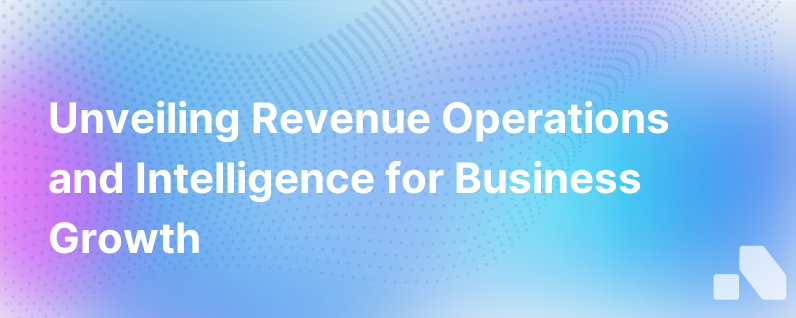What Is Revenue Operations And Intelligence Roi
Published on September 26, 2023 by Sawyer Middeleer
In the rapidly changing landscape of B2B sales, where data rules and buyer expectations are constantly evolving, modern organizations are seeking new ways to drive growth and streamline their sales processes. Enter Revenue Operations and Intelligence (ROI), a strategic framework that combines data-driven insights with coordinated operational efforts to propel businesses toward higher revenue outcomes.
Understanding the Origins of ROI
ROI is not just a buzzword; it's the natural progression of aligning sales, marketing, and customer success operations into one synchronized engine aimed at increasing revenue. Coined from integrating "Revenue Operations" (RevOps) and "Sales Intelligence," this approach involves harnessing data analytics, AI, and automation to navigate the complexity of today's sales environments effectively.
The Pillars of Revenue Operations and Intelligence
To fully grasp the potential of ROI, we need to dissect its two main components.
Revenue Operations (RevOps)
RevOps is the backbone of the ROI framework. This operational strategy involves unifying the traditionally siloed business functions—sales, marketing, and customer support—into a single entity. By breaking down these barriers, organizations can create a seamless flow of information and strategies, which results in:
- Enhanced efficiency across the revenue-generating process
- Improved transparency and data accuracy
- Reduced operational friction and increased agility
Sales Intelligence
The second component, Sales Intelligence, acts as the nervous system of ROI. It provides the data and actionable insights that inform strategic decision-making. With advanced analytics, machine learning, and AI, Sales Intelligence tools deliver:
- Real-time insights into customer behaviors and market trends
- Predictive analytics for forecasting and buyer intent detection
- Tailored strategies for individual customer accounts and segments
The Key Functions of Revenue Operations and Intelligence
An effective ROI strategy employs several key functions:
-
Data Integration and Management: Centralizing data from disparate systems to provide a holistic view of business performance.
-
Process Optimization: Streamlining, automating, and standardizing operations to reduce redundancies and enhance customer experiences.
-
Performance Analysis: Leveraging data analytics to measure and improve upon key performance indicators (KPIs).
-
Strategic Alignment: Ensuring that every action taken by sales, marketing, and customer success supports the overarching company goals.
-
Change Management: Being adaptable and responsive to market shifts and internal dynamics to maintain the competitive edge.
-
Technology Leverage: Investing in the appropriate tech stack that empowers teams with sophisticated data analysis and automation capabilities.
The Benefits of Implementing ROI in an Organization
Simply put, an effective ROI strategy helps organizations make smarter decisions faster and execute them more efficiently. Here are just a few of the advantages:
-
Increased Revenue: Unsurprisingly, aligning all revenue-related activities boosts earnings, often through streamlining the lead-to-cash process and optimizing lifetime customer value.
-
Improved Collaboration: RevOps breaks down silo walls, fostering a culture of collaboration that accelerates innovative solution development and problem-solving.
-
Enhanced Forecasting: With rich data and predictive models, businesses can forecast revenue streams and market demand with greater accuracy.
-
Heightened Accountability: Clear visibility into operations and outcomes holds teams accountable to shared goals and makes pinpointing areas for improvement easier.
-
Scalability: ROI systems standardize processes and make them repeatable, which is a cornerstone of sustainable growth as businesses scale.
-
Customer Centricity: A unified operational approach centers the customer experience at every interaction, enhancing satisfaction and repeat business.
The Challenges and Considerations of ROI
Despite ROI's promise, companies often encounter obstacles in implementation. Common challenges include:
-
Data Fragmentation: With multiple tools and platforms in play, aggregating data can be daunting.
-
Change Resistance: Implementing ROI requires a cultural shift, which can be met with resistance from established departments.
-
Skill Gaps: A successful ROI strategy needs individuals who are adept at both operational tactics and data analysis.
-
Technology Overload: It's easy to become overwhelmed by the number of available tools; careful selection is crucial to avoid wasted investments.
Leveraging Technology in ROI
Technological investment is crucial for ROI endeavors. Powerful tools such as CRM platforms, marketing automation, and advanced analytics software are not just nice-to-haves—they're essential. With the right technology stack, ROIs can be planned, executed, and adjusted in real-time.
Enhancements such as AI and machine learning can take ROI even further, automating repetitive tasks, surfacing deep insights from vast datasets, and predicting trends before they become apparent. This allows sales teams to stay agile and proactive, giving them a competitive advantage.
ROI as a Continuous Process
ROI is not a set-it-and-forget-it solution. To truly capitalize on its potential, organizations should view ROI as a continuous improvement process. Routine monitoring, data updates, process tweaks, and tech stack enhancements should be the norm, not the exception.
Conclusion
A successful ROI strategy can be the catalyst a B2B company needs to drive strategic growth and adapt to the future's sales landscape. By bringing together seamless operations and cutting-edge intelligence, businesses can not only survive in the evolving world of sales but thrive.ROI is not a magic bullet, but it's the most comprehensive approach to modern revenue generation we have to date.
As the marketplace continues to grow in complexity, strategies such as ROI become not just a strategic advantage but a necessity for survival and prosperity. Whether you're a startup poised for rapid growth or an established organization pivoting to new markets, embracing the principles of Revenue Operations and Intelligence could mark the beginning of your most lucrative chapter yet.